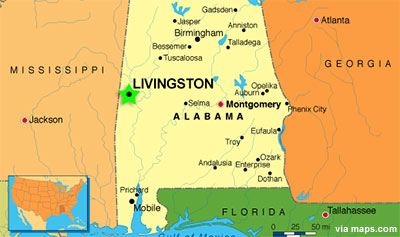In the seconds after Malcolm Butler's interception, you would assume the most powerful shockwaves of excitement were emanating out of Boston, where New England Patriots fans were hysterical after all-but-clinching their fourth Super Bowl victory.
You would be wrong. If we're adjusting for size, the biggest celebration was happening in Livingston, Alabama. Population: 3,506.
That's where Butler played college football at the University of West Alabama. And it's where students, former teammates, faculty, administrators and citizens alike, were over-the-moon happy just to see a former Tiger suiting up and contributing in the Super Bowl.
And then Butler picked off Russell Wilson at the goal line, dropped to the ground and rose a football hero.
Meanwhile, West Alabama was losing its mind.
"Within seconds," says UWA president Ken Tucker, regarding how long it took before the wave of phone calls and texts hit. "I mean, literally, within seconds.

"There were multiple chills going up multiple spines."
Before the interception, Butler was already a local hero. Tucker says he is the first student-athlete from the school to play in the NFL. [Note: several former student-athletes reached the NFL when the school was known as Livingston College.]
West Alabama athletic director Stan Williamson says that because Butler was so well-liked as a student-athlete by students, faculty and staff -- Tucker describes him as "such a good person, very sincere, very team-oriented" -- embracing his success came naturally.
Suffice it to say, Butler was one of the bigger things to happen to the University of West Alabama -- and that was before his critical interception.
Butler's story of success is one that the school is eager to hang its hat on. He attended West Alabama after spending two years at Hinds Community College. Although he drew interest from Division-I programs, his academic situation coming out of junior college was better served by attending UWA, a Division II school.
For Butler, who grew up in Vicksburg, Mississippi, West Alabama allowed him to thrive. College was an opportunity Butler struggled to maintain: In junior college, he was working full-time at Popeye's fast-food restaurant on top of his football and academic commitments. At West Alabama, he was able to participate in a work-study program while leading the football program to two straight Gulf South Conference championships.

"[Western Alabama] is primarily a rural area," Tucker says. "We offer quality, affordable, accessible education primarily to first-generation college students.
"This is a family-oriented environment, and it's a very high-performance culture. But I must admit, the energy level was probably as high [the day after the Super Bowl] as it has been in years and years and years."
West Alabama athletic director Stan Williamson can only concur. Like Tucker, most of his Monday was spent handling media inquiries and strategizing with other school officials about how to handle the newfound buzz. Williamson says he has been flooded with nonstop emails, tweets and phone calls, including some from people he hadn't heard from in decades.
"There's a feeling of excitement across campus," Williamson says. "I had a staff member who said he couldn’t go to sleep last night, his Twitter kept going off every 30 seconds on his phone. I asked him, 'You know you can turn that off, right?' And he eventually did.
"That's the thing: He wanted to go to sleep, but he didn't want to, either."
In a way, Butler's signature play -- likely be the greatest moment of his career, no matter how bright his future -- is a microcosm of his struggle to get to that point. Facing second-and-goal from the 1-yard-line, and in a situation that would seem to call for a power running play, Seattle calls an inside slant that almost seems designed to pick on Butler, the unsuspecting rookie.
But Butler proved to be anything but a weak link. As soon as the play develops, Butler sees what happens. He actually beats Seattle wideout Ricardo Lockette in breaking inside for Wilson's pass, reaching the ball the same time as Lockette. Although Lockette outweighs Butler by about 20 pounds, the rookie wins what is essentially a jump ball, maintains his hold through contact, and makes the play of the year.
To the rest of the country, Butler will forever be defined by that play. And maybe that's how it will go down at the University of West Alabama, too. But the people on campus make it clear that their support of Butler has nothing to do with his new-found status as a Super Bowl hero.

"[Malcolm] is such a good person, and a humble person, people were cheering for him no matter what," Williamson says.
Tucker says a small group of leaders at UWA will get together soon to figure out how to best honor Butler. Everything is on the table, from a Malcolm Butler Day to a parade, to a luncheon celebrating his accomplishment.
In the meantime, the school is hoping Butler's success can strengthen the university's reputation in the region. Both the athletic department and the administration are looking at ways they create more good out of the increased media attention.
"Everybody’s reveling in the moment, but we also would like to seize the opportunity and seize some positive long-term impacts for the football program in particular and the university in general," Tucker says.
To West Alabama, Butler's story is more than 15 minutes of fame. The hard work behind his success could inspire other students to pursue the highest reaches of their potential.
"We don’t have a mall, we don't even have a Wal-Mart," Williamson says. "We have several dollar stores and a few great grocery stores, and that's about it."
"I think the thing [his performance] created was not just the play he made, it was the idea that, if you continue to work hard, there’s a good chance something good will happen."






